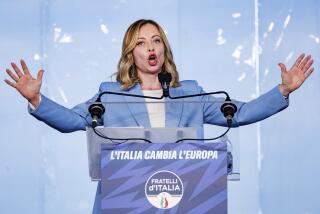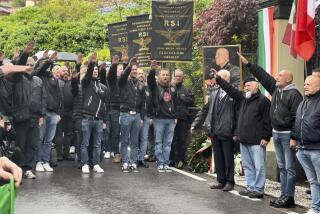Italy’s Depressed Economy May Drag Down Prime Minister
- Share via
ROME — Prime Minister Silvio Berlusconi’s motorcade zipped through Rome’s Piazza di Spagna the other day, past the fuchsia azaleas cascading down the Spanish Steps, headed toward a ceremony honoring the national police.
“Crook! Crook!” shouted several Italians who recognized their leader as he passed.
Berlusconi has done what no other Italian prime minister has managed since World War II: stayed in power nearly a full term. But these days, public anger over Italy’s moribund economy has finally leveled a serious threat to Berlusconi’s political future.
Divisions within his quarrelsome coalition, combined with signs of new electoral strength for an often inept opposition, have left Berlusconi in his most precarious position since 1994, when he was forced from another, brief stint as prime minister.
One of the world’s richest men, Berlusconi, 68, is a media tycoon who has often overseen legislation that benefits him or his interests. He sent Italian troops to Iraq against overwhelming public opinion and periodically faces conflict-of-interest charges in court.
Yet none of this has seemed to matter to voters. He has held on to his office for four years. Only now, as Italy’s economy hits historic lows, is deep discontent translating into political action.
“Berlusconi is no longer able to do what he tried to do that last couple of years, blame [the economic downturn] on outside factors: the euro, international recession and so forth,” said James Walston, a political scientist at Rome’s American University.
“Italians aren’t buying it anymore. He tells them he cut their taxes, but they know they are paying more taxes, and more for everything.”
In a string of humiliating defeats, Berlusconi’s center-right coalition last month lost elections in 12 of 14 regions. And last week, his coalition lost in most of the island of Sardinia, where Berlusconi owns numerous luxury villas.
Berlusconi was suddenly being discussed, on radio talk shows and in coffee bars, in the past tense. He was a lame duck, people said. Debated scenarios included early elections or a major restructuring of the center-right coalition to ease him out.
The beleaguered prime minister, a relative novice in politics when he first ran for office in the early ‘90s and someone the Bush administration regards today as its strongest ally in continental Europe, gained a bit of respite this week in local voting in Sicily, land of ancient Greek ruins and a still-active Mafia.
Umberto Scapagnini, Berlusconi’s candidate -- and personal physician -- defied predictions and won election as mayor of Catania, one of the island’s most important cities. Officials from Berlusconi’s party, Forza Italia (Go, Italy), credited the fact that the prime minister flew to Sicily and stumped on Scapagnini’s behalf.
“The numbers speak for themselves,” Berlusconi said. “United, we can win.”
Some saw the victory as Berlusconi’s salvation. Italy’s leading daily Corriere della Sera said he had faced and won the most important test of his leadership since taking office in 2001.
But Walston and other analysts believe the relief is temporary. There are no economic miracles on the horizon, they say, that can salvage the government ahead of general elections next spring.
Italy has been formally branded one of the worst performing economies in Europe -- and the weakest link in the bloc of 12 nations that use the euro currency. Data released this month showed the country has plunged into recession for the second time in as many years, and Finance Minister Domenico Siniscalco was forced to slash the nation’s 2005 growth forecast for the second time this quarter.
Most of Italy’s economic problems are entrenched and predate Berlusconi. But he comes in for criticism for ignoring bad news and failing to act.
Saddled with the third-largest debt in the world, Italy relies heavily on family-controlled businesses (like Berlusconi’s). It has failed to diversify into high-tech industries, maintaining traditional trades like clothing that are vulnerable to cheaper foreign competition. Important sectors including energy remain in the hands of inefficient state monopolies, and a very large public sector demands expensive pensions.
“Let’s not amuse ourselves with words that are more or less technical -- recession, stagnation, stagflation.... There is only one appropriate word to decipher our economic situation: disaster,” Eugenio Scalfari, founder of La Repubblica newspaper, said in a front-page editorial.
Berlusconi is also being criticized by people of more kindred spirit.
Luca di Montezemolo, the influential head of Italy’s employers’ federation, recently called for early elections after blasting the government’s handling of the economy. He said Italian industry was facing its worst crisis since World War II and accused Berlusconi of turning a blind eye to the trouble.
Berlusconi’s foreign minister and coalition partner, Gianfranco Fini, demurred when asked by a group of foreign reporters if he favored Berlusconi as the politician to head the center-right parties in next year’s election.
Later, commenting on the economy, Fini said: “The premier must assume the political responsibility and act.”
Italy’s principal center-left opposition coalition, led by former president of the European Commission Romano Prodi, has typically been too divided to seriously challenge Berlusconi.
Although the opposition has made significant gains in recent voting, it is Berlusconi’s failings that will determine who will lead the next government of Italy, analysts said.
“It wouldn’t be Prodi leading the center-left to victory,” Walston said. “It would be Berlusconi leading the center-right to defeat.”
More to Read
Sign up for Essential California
The most important California stories and recommendations in your inbox every morning.
You may occasionally receive promotional content from the Los Angeles Times.











